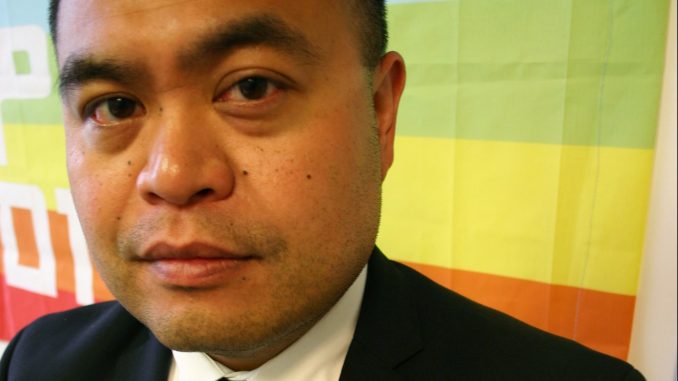
At a conference in the Philippines in 2008, Randy Duque saw an attorney struggling when teaching conflict resolution to uninterested members of the island nation’s Marine Corps.
“To me, it seemed like they were looking at him as some tree-hugging hippie,” he said.
Duque realized that he wanted to better understand how to resolve conflicts involving the military and relate to that side. So when he returned to the United States from his parents’ home country, he joined the Pennsylvania Army National Guard as an infantryman. He’s since risen to the rank of sergeant in the branch.
“I did everything backwards,” the 1998 and 2004 alumnus said. “Instead of going into the Army first, I went after I got my master’s degree.”
The experience “helped me understand military culture and military thinking, and also it does kind of give me some ‘street cred’ when it comes to working with law enforcement or other military,” Duque said.
After about a decade with Good Shepherd Mediation Program in Germantown, Duque became the deputy director of the Philadelphia Commission on Human Relations in 2014.
“This is essentially the city’s conflict resolution agency … dedicated to upholding civil rights and anti-discrimination laws,” Duque said. “Since I’ve taken over, I’ve wanted us to place even greater emphasis on community building.”
Recently, PCHR got involved in the debate surrounding a proposed football stadium on Main Campus. At a Board of Trustees meeting on Feb. 8, Duque was one of 10 people who testified during the meeting’s public comment portion.
“As a graduate from Temple University, I want to make sure that this school continues to work in partnership and be a part of the community,” Duque said at the meeting. “There is a feeling that the community is not being involved.”
His work with PCHR has also taken him to protests around the city—including some in opposition to the stadium—as the Commission also monitors police-protester and police-community relations. Duque said it’s more common to see passersby jeering at protesters than officers crossing the line of acceptable conduct.
A common issue across most of the city’s neighborhoods, he said, is a lack of communication: some residents “just don’t talk to their neighbors.” The commission hopes to address this by publishing a “good neighbor guide” that encourages communication between longtime residents and new neighbors, whether they’re students or immigrants, two common types of newcomers.
“It’s all common sense, but it’s not something people do,” Duque said, adding that it’s an issue he’s heard about in the Temple community too. And he has had personal experience with it as well: though he was born in Northeast Philly and raised in Olney, he recently moved into a rowhouse in Fairmount, and after unpacking he introduced himself to his surprised next-door neighbor.
“She told me, ‘You’re different. The girl next door lived there for eight-and-a-half years and I only found out her name last week,’” Duque said.
Since receiving his master’s in applied communications in 2004, Duque has been back and forth to Main and Ambler Campus, teaching classes as an adjunct professor in the adult and organizational development program from 2005.
His graduate education covered several components of his field like developing training and group decision-making, but he’s been most passionate about being a mediator and ensuring that city residents can learn how to resolve conflict themselves.
“I really can’t thank the Temple program enough,” Duque said. “It really shaped me to operate on an interpersonal level but also understand and appreciate both conflict and resolution and all ways of understanding it.
While at Temple, Duque was in classes with and mentored by Dr. Tricia Jones and Joe Folger, a professor and the coordinator for the AOD program, who developed a prominent model for mediating conflicts.
“Just because of who he is, he has insight into the challenges that these immigrant communities face,” Folger said. “He really resonated with the whole idea of conflict resolution.”
In addition to his work in Philly, Duque serves as the president for the Greater Philadelphia chapter of the Association for Conflict Resolution, and was on a team of mediators sent to the Middle East to hear both sides of the Israeli-Palestinian conflict.
In the West Bank, he met with NGOs, Jewish sects, religious leaders and mediation centers there.
“People felt that there could be a two-state solution, for most people on the West Bank it’s not about religion so much as the land in their point of view,” Duque said.
“People need to learn how to listen and empathize, or take steps to be able to empathize with another person,” he said.
Joe Brandt can be reached at jbrandt@temple.edu or on Twitter @JBrandt_TU.


Be the first to comment